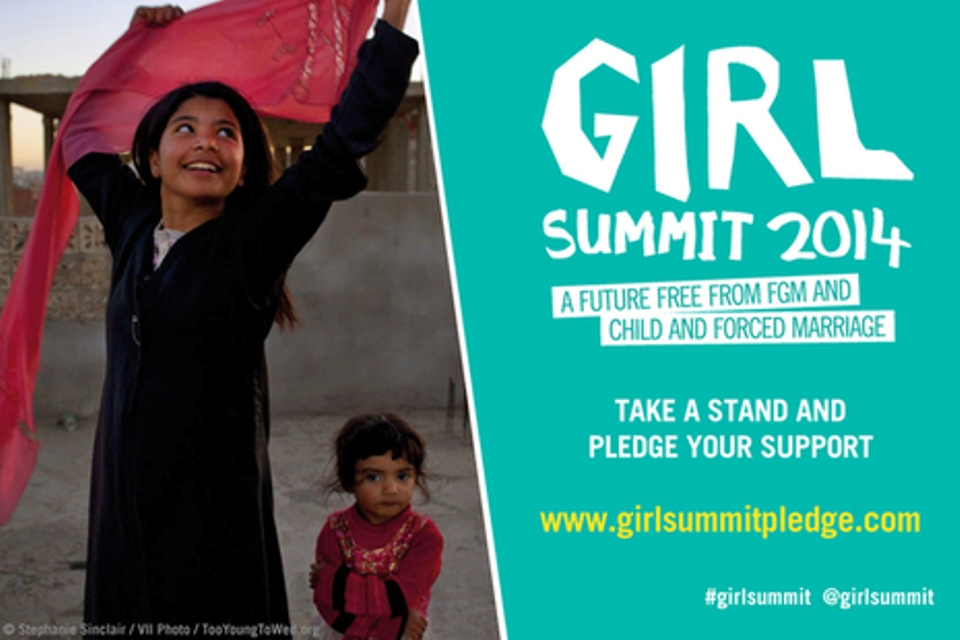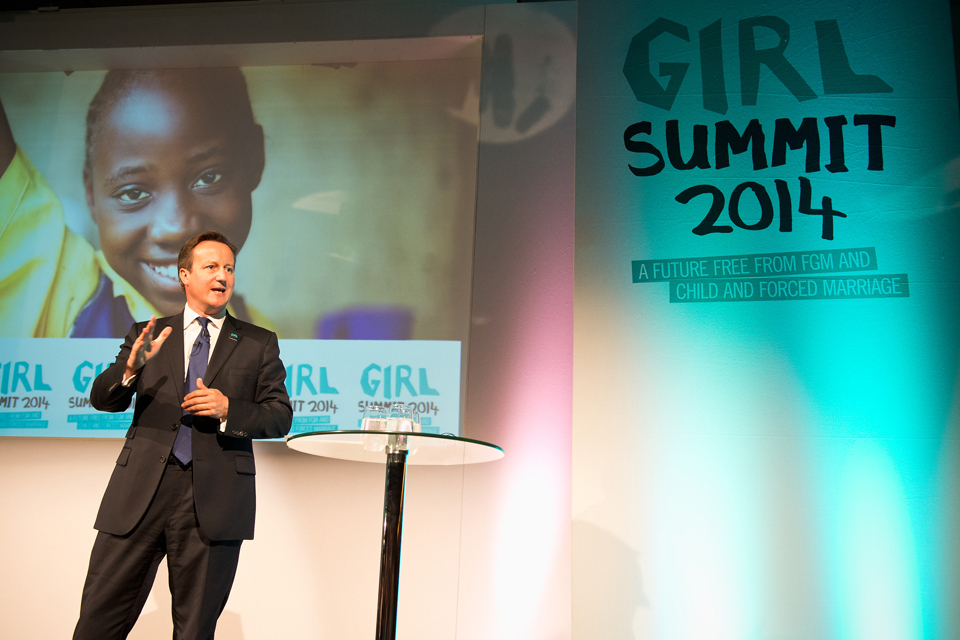Girl Summit 2014: David Cameron's speech
David Cameron's speech from the 2014 Girl Summit held in London.


David Cameron speaking at the Girl Summit
Well thank you very much Tony and thank you ladies and gentleman.
I’m absolutely delighted that Britain is hosting this conference. It comes in a year where I hope we’re doing everything we can to demonstrate how much we care about these issues. Justine Greening, Secretary of State for International Development, has put women and girls and equality right at the heart of our aid program. I know you heard from Theresa May, the Home Secretary, who is introducing really important legislation this year to tackle modern slavery, and, until recently our Foreign Secretary, William Hague, did a great job at putting front and centre the importance of preventing sexual violence in conflict.
So this conference today should be seen in that context. These are vitally important issues we’re addressing and I’m really proud that Britain is determined to play her part.
I want to say a few thank-yous. I think, let’s start with thanking the Walworth Academy for hosting us so brilliantly. A big thank you to you. I want to thank the 50 countries that are taking part, the NGOs, the faith organisations, civil society, I want to thank all of you for coming today and making this such an energetic and important conference. But I want to say a particular thank you to those people who have experience of FGM or early and forced marriage who’ve spoken out. It takes huge bravery to do that and I want to thank you for doing that.
I go to lots of conferences and events and seminars and think tanks and all the rest of it, and sometimes you sit there and you’re not quite sure what you’re trying to achieve. Here, it is absolutely clear about what we are trying to achieve, it is such a simple but noble and good ambition, and that is to outlaw the practices of female genital mutilation (FGM) and childhood and early forced marriage, to outlaw them everywhere, for everyone within this generation. That is the aim. That is the ambition.
Now, Britain doesn’t have any special magic. We wanted to host this conference because we wanted to bring people together. We’re proud of our record on aid and development. We’re proud that we kept our promises to the poorest people in the world. We’re one of the few countries that have met our aim of 0.7% of our GDP, but we don’t pretend any special knowledge or any special magic. We just wanted to bring people together and see what we could do to help, with the power of convening people to come up with ideas and commitments to outlaw these practices. That is what today is all about.
But for me the context is very simple. The context is about equality. I’m a dad with 3 children, 2 girls and a boy, and I want my girls to grow up with every opportunity that my son has, with no disadvantage, with the chance to make everything that my girls can of their lives. And that is really what this is, it’s about equality.
And there – of course, there are so many things, when it comes to tackling inequality, we need to address, whether it is equal pay or equal rights or fighting discrimination or equal opportunities, including in political life. But what seems to me is so important about these 2 issues is they are absolutely standing rebukes to our world that they still exist. And so when we think of the fight for equality, which should be at the heart of the commitments to the Millennium Development Goals, it’s absolutely clear to me that we’ve got to start with outlawing these practices, which is why today’s conference is so important.
Now when we make commitments like this, I think we have to ask ourselves 3 very straightforward questions: why give these issues such a priority? How are we going to achieve our goals? And, crucially, what we are about to do – will it work? And how are we going to follow up on the promises that we make?
Now the why, I think, is simple. These practices aren’t just simply a violation of girls’ rights. They are a total violation of the chance to enjoy your childhood and the chance to lead a fulfilling life. That is why these issues matter so much.
And the figures are so shocking. Here in the United Kingdom, 130,000 people affected by FGM. 60,000 girls under the age of 15 potentially at risk. And then when we consider the global figures: 130 million women in our world affected by FGM and 63 million more potentially at risk by 2050.
And when we look at the problems of childhood and early forced marriage, in our world today, 700 million people married as children, and a further 280 million at risk. When we think of the great development challenges that we face, of eradicating poverty, of dealing with diseases – malaria, TB, polio – this ranks alongside that in terms of the scale of the challenge that we face and the scale of the ambition that we need in order to defeat it.
But, above all, in answering the question, ‘Why these 2 issues?’ I would argue that we are dealing with a preventable evil. This does not have to happen. And with the right combination of effort, political will and hard work, we can achieve what we have set out to achieve.
So how do we do it? Well, I think this charter that countries have signed today and organisations are signing today is so simple and clear, written in plain language, very clear commitments that people and countries are making, and I think what is so good about it is that it understands the fundamental point that simply passing a law, or simply spending some money, is not enough.
Politicians are very good at passing laws – we’re also quite good at spending money – but what politicians aren’t always good at is following through and making sure that a change in law leads to a change in culture, leads to a change in practice, and that is why I think this charter, with all the commitments it makes for what countries and families and people must do, is so good.
And here in Britain, we want to be good to our word. It is already illegal to marry as a child. It is already illegal to push someone into a forced marriage. It’s already illegal to take part in female genital mutilation. But that’s not enough, and so I can tell you today about the pledges we are making, that we are saying it will now be a mandatory duty for doctors and teachers and others to report when these things happen so that we can put a stop to it, and for the first time, we’re going to legislate so that parents are liable if they allow their daughters to be cut.
Of course, added to this are the funds that we’ll provide, both here, domestically in the UK, and £25 million to international help in terms of childhood and forced marriage and £35 million commitment to help fight FGM internationally. I believe if we adopt this charter, if we use it as a campaigning vehicle to start the campaign now and all over the world, we can achieve the goals that we have.
So to that final question: will it work? Well, we’ve already got 230 signatures. We’ve already got 21 governments that have made that commitment. But, as Tony said, what this has got to be about is building a global movement: a global movement that doesn’t end here, a global movement that starts here and a global movement that we can follow up, monitoring what the countries have done who signed this, what the organisations have done who have signed this, to check that people keep their promises, to check that we don’t just change the law we change the culture, to check that we follow up on every single commitment that we’ve made.
I’ve told you about my children. So my daughter – my eldest daughter is 10; not that much younger than some of the children who get pushed into childhood or early marriage; not that much younger than girls who get cut and have their lives, in so many ways, taken away from them. And this really is about the world that we want children like my daughter to grow up in. Is it going to be a world where we recognise that these practices are unacceptable, but instead of just saying that, instead of just signing declarations, instead of just passing laws, we actually commit to do everything we can, in our own countries and globally, to outlaw these practices forever.
That is the commitment that Britain makes. That is the commitment that the 21 countries have made. Now let us take this campaign, let us run it globally, and let us outlaw these practices and improve the state of our world.
Thank you.